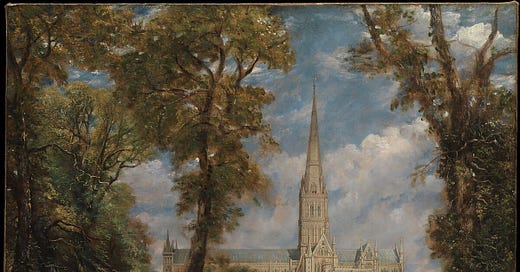taste, agency, and brideshead revisited
Lately taste has started to seem less important to me. This is surprising. I’ve spent years thinking about how important taste is, how the media we engage with gives us templates for engaging with the world in turn, how the things and places we surround ourselves with are as much a part of us as our thoughts and ideals – and are inseparable from these thoughts and ideals. I still think that these things are true. They’ve just started to feel less dire. As far as I can tell there are two reasons for this.
I. The first is that my agency has increased. I spend most of my time writing and teaching. I receive positive feedback and the sense that I am doing what I need to do to build a career. I have a wider pool of material resources and a stable environment. Whether or not I have good taste in books or art doesn’t have any impact on my stipend, or whether my presentation at a conference is well received, or whether my students get firsts on their exams. It’s true that I need to be a good reader to do my job, but a good reader of Sophocles, not the entirety of mass culture. This sense of efficacy, which is tied to a sense of specificity, is satisfying in a kind of open-and-shut way. I succeed or I don’t.
In this environment, a focus on taste seems to me to be a manifestation of insecurity, a hyperawareness of what one can control. You can learn to be discerning of what movies you watch or what you wear or what books you read even if you lack certainty in your life. I think this is why taste is so important for young people and students, and this is why they situate so much of their identity in their taste. What else can you identify with when you’ve made very little in your life, when you aren’t at all sure of the future and your role in it?
What’s curious to me is the fact that so many people, not just young people, seem to situate their identities primarily in their tastes right now. At the same time, a lot of people have expressed to me that they feel a lack of agency.
II. The second, more slippery reason is, I think, the time I’ve spent exposed to wealthier people. In Paris and at Cambridge I’ve encountered lots of people who are not only wealthy, but ‘cultured’. Before spending time in these environments, I honed my taste because doing so allowed me to map out my aspirations. I was raised middle class in a small town in the States. As I got older, I had the jarring realization that I wanted to pursue classics – a field of study that I hadn’t even known existed for the first 18 years of my life. In my first Greek class, I met people who had already spent a long time with the classics and who were seeking academic careers. When asked why I wanted to study Greek, I said honestly that I had been moved by the Iliad when I had encountered it in one of my first university classes, and that I wanted to understand the language better. A fellow classmate later told me that he thought this had been a strange, slightly embarrassing answer.
At university I started to glimpse another life that I hadn’t even thought possible, and I used my taste to articulate its boundaries. Having ‘good taste’ at that moment felt life altering. This was a different kind of agency – I used narrative and image, the world of figurative language and the imaginary, to explore and concretize a more mundane reality. I think this is the experience of the striver. It’s why something like Brideshead Revisited resonated so much with me when I first read it – Charles’ motivations are essentially driven by aesthetics and tastes, and he uses his taste to imagine a different career for himself than anything that his father would have suggested.
Charles’ aesthetics in Brideshead are, of course, shaped by his encounters with astronomical wealth, and part of the narrative deals with his slow realization that these aesthetic trappings don’t point to anything magical, or more meaningful, but instead just make up the mundanities of his friends’ often frustrating, banal lives. In Paris and at Cambridge I realized that the book under someone’s arm, or the way they dress, or the art exhibitions they go to, don’t tell me much about that person. These things tell me that these people are performing their own class in the way that everyone else around them does. Character is something more evasive. It’s not tied to a style or a propensity for a certain kind of literature – it emerges over time, in quiet moments that are easy to miss.
When I was a child, my favorite band was Coldplay. My favorite show was Glee, which I loved to watch with my mom. I loved musical theater and YA romance. I still wish I had had access to more challenging, compelling things, but I also feel a bit less ashamed of these things. It all makes me wonder if the cultivation of my own taste was always just a way to deal with the fact that I was simultaneously insecure about and fascinated with my growing proximity to wealth and the intelligentsia. I suppose my disenchantment, and my sense that I’m working effectively within the academic sphere, have set me free from my own taste to some extent. It still matters, but I don’t want to agonize over it anymore.
edit: i will still continue to write and think about what is good and what is bad and why that is important. i think i am just trying to find a way to be slightly nicer to myself.


